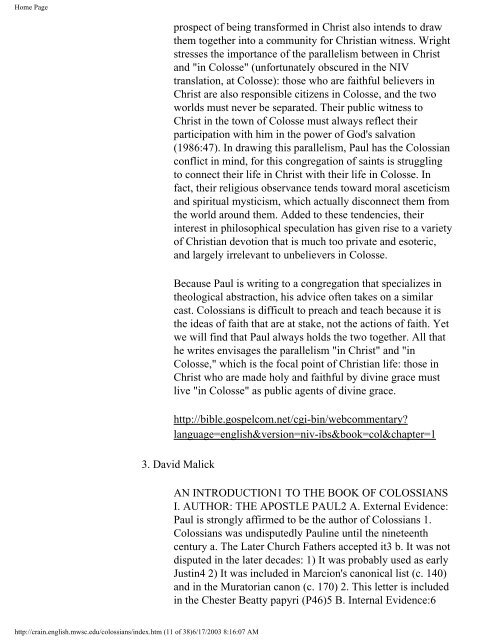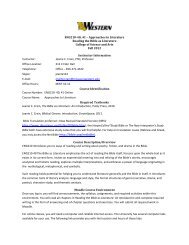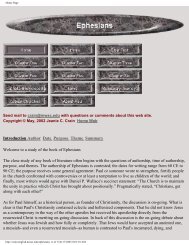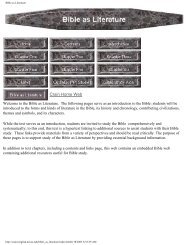Introduction to Colossians: Authorship, Date, Audience - Crain Home
Introduction to Colossians: Authorship, Date, Audience - Crain Home
Introduction to Colossians: Authorship, Date, Audience - Crain Home
Create successful ePaper yourself
Turn your PDF publications into a flip-book with our unique Google optimized e-Paper software.
<strong>Home</strong> Page<br />
prospect of being transformed in Christ also intends <strong>to</strong> draw<br />
them <strong>to</strong>gether in<strong>to</strong> a community for Christian witness. Wright<br />
stresses the importance of the parallelism between in Christ<br />
and "in Colosse" (unfortunately obscured in the NIV<br />
translation, at Colosse): those who are faithful believers in<br />
Christ are also responsible citizens in Colosse, and the two<br />
worlds must never be separated. Their public witness <strong>to</strong><br />
Christ in the <strong>to</strong>wn of Colosse must always reflect their<br />
participation with him in the power of God's salvation<br />
(1986:47). In drawing this parallelism, Paul has the Colossian<br />
conflict in mind, for this congregation of saints is struggling<br />
<strong>to</strong> connect their life in Christ with their life in Colosse. In<br />
fact, their religious observance tends <strong>to</strong>ward moral asceticism<br />
and spiritual mysticism, which actually disconnect them from<br />
the world around them. Added <strong>to</strong> these tendencies, their<br />
interest in philosophical speculation has given rise <strong>to</strong> a variety<br />
of Christian devotion that is much <strong>to</strong>o private and esoteric,<br />
and largely irrelevant <strong>to</strong> unbelievers in Colosse.<br />
Because Paul is writing <strong>to</strong> a congregation that specializes in<br />
theological abstraction, his advice often takes on a similar<br />
cast. <strong>Colossians</strong> is difficult <strong>to</strong> preach and teach because it is<br />
the ideas of faith that are at stake, not the actions of faith. Yet<br />
we will find that Paul always holds the two <strong>to</strong>gether. All that<br />
he writes envisages the parallelism "in Christ" and "in<br />
Colosse," which is the focal point of Christian life: those in<br />
Christ who are made holy and faithful by divine grace must<br />
live "in Colosse" as public agents of divine grace.<br />
http://bible.gospelcom.net/cgi-bin/webcommentary?<br />
language=english&version=niv-ibs&book=col&chapter=1<br />
3. David Malick<br />
http://crain.english.mwsc.edu/colossians/index.htm (11 of 38)6/17/2003 8:16:07 AM<br />
AN INTRODUCTION1 TO THE BOOK OF COLOSSIANS<br />
I. AUTHOR: THE APOSTLE PAUL2 A. External Evidence:<br />
Paul is strongly affirmed <strong>to</strong> be the author of <strong>Colossians</strong> 1.<br />
<strong>Colossians</strong> was undisputedly Pauline until the nineteenth<br />
century a. The Later Church Fathers accepted it3 b. It was not<br />
disputed in the later decades: 1) It was probably used as early<br />
Justin4 2) It was included in Marcion's canonical list (c. 140)<br />
and in the Mura<strong>to</strong>rian canon (c. 170) 2. This letter is included<br />
in the Chester Beatty papyri (P46)5 B. Internal Evidence:6






![[38cb1273][0][sourcelist][1][0] - Crain Home](https://img.yumpu.com/2168350/1/190x245/38cb12730sourcelist10-crain-home.jpg?quality=85)